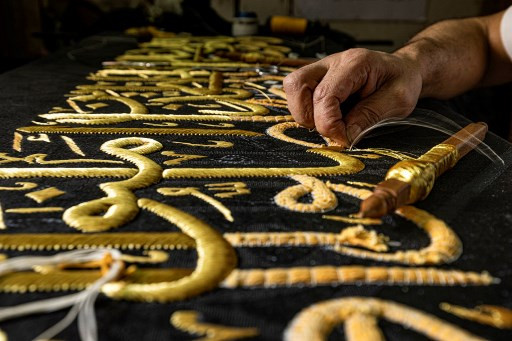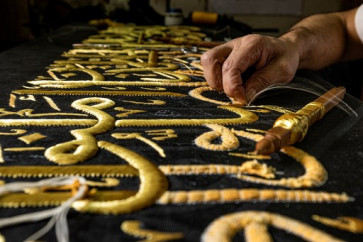Popular Reads
Top Results
Can't find what you're looking for?
View all search resultsPopular Reads
Top Results
Can't find what you're looking for?
View all search resultsEgypt family keeps alive tradition behind haj centrepiece
His family's creations would be despatched in a camel caravan to Islam's holiest site in western Saudi Arabia towards which Muslims across the world turn to pray.
Change text size
Gift Premium Articles
to Anyone
 An embroiderer sews with gold thread a verse from the Holy Koran, Islam's holy book, onto a replica of the Kiswa, the cloth used to cover the Kaaba at the Grand Mosque in the Muslim holy city of Mecca, to be sold as a souvenir for tourists visiting the historic district of al-Hussein of Islamic Cairo in Egypt's capital on June 15, 2022. From the 13th century, Egyptian artisans made the giant cloth in sections, which authorities transported to Mecca with great ceremony. Celebrations would mark processions through cities, flanked by guards and clergymen as Egyptians sprinkled rosewater from balconies above. From 1927, manufacturing began to move to Mecca in the nascent Kingdom of Saudi Arabia, which would fully take over production of the kiswa in 1962.
(AFP/Khaled Desouki)
An embroiderer sews with gold thread a verse from the Holy Koran, Islam's holy book, onto a replica of the Kiswa, the cloth used to cover the Kaaba at the Grand Mosque in the Muslim holy city of Mecca, to be sold as a souvenir for tourists visiting the historic district of al-Hussein of Islamic Cairo in Egypt's capital on June 15, 2022. From the 13th century, Egyptian artisans made the giant cloth in sections, which authorities transported to Mecca with great ceremony. Celebrations would mark processions through cities, flanked by guards and clergymen as Egyptians sprinkled rosewater from balconies above. From 1927, manufacturing began to move to Mecca in the nascent Kingdom of Saudi Arabia, which would fully take over production of the kiswa in 1962.
(AFP/Khaled Desouki)
U
nder the steady hum of a ceiling fan, Ahmed Othman weaves golden threads through black fabric, creating Koranic verses, a century after his grandfather's work adorned the Kaaba in Mecca's Grand Mosque.
A ceremonial hanging of the kiswa, huge pieces of black silk embroidered with gold patterns, over the cubic structure that is the centerpiece of the Grand Mosque symbolizes the launch of the hajj annual pilgrimage, which starts this week.
Othman's family used to be honored with the task of producing the kiswa.
His family's creations would be despatched in a camel caravan to Islam's holiest site in western Saudi Arabia towards which Muslims across the world turn to pray.
Now, Othman keeps the tradition alive in a small workshop, tucked above the labyrinthine Khan al-Khalili bazaar in central Cairo, where mass-produced souvenirs line the alleys.
The area is historically home to Egypt's traditional handicrafts, but artisans face growing challenges.
Materials, mostly imported, have become expensive, particularly as Egypt faces economic woes and a devalued currency.


















